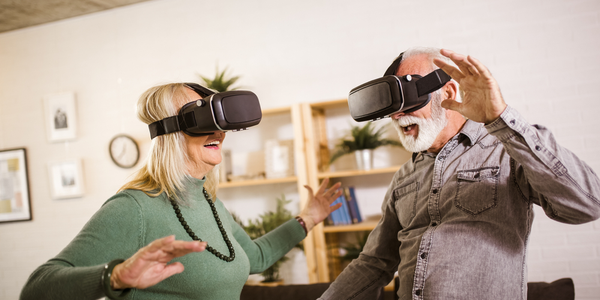4 Ways Virtual Reality Can Improve Your Health and Well-Being After 60

How Virtual Reality is Transforming Experiences for Seniors
What do you think of when you hear the words “virtual reality”? If it’s a vision of young people wearing headgear and wildly waving their arms around at nothing … well, you’re right. But virtual reality, VR for short, isn’t just for the youngsters anymore. Seniors are experiencing incredibly positive health outcomes with VR!
While VR may sound like science fiction, tech companies are taking interest in the senior market. In a series of articles over the next few months, we’ll explore how VR can improve your health and well-being.
What is Virtual Reality?
But first, we need to know what virtual reality really is. VR is simply a computer-generated, three-dimensional experience. At a minimum, when you’re in VR, you’ll wear a headset with a built-in screen providing 360-degree views of your virtual surroundings. Many VR systems also come with headphones to incorporate sounds. And you might have handheld controllers so you can interact with the virtual environment you see.
Perhaps one of the best parts about this new medium is that you’re totally in control of the experience. Dive in and learn everything there is to know or take your time exploring. Some programs only require you to sit in a comfortable chair and enjoy the views. More seasoned users might get up and move around a virtual world.
How VR benefits seniors
Virtual reality isn’t a novelty anymore. And the available apps aren’t just games, either. From simple relaxation exercises to rebuilding cognitive functioning, the advantages for seniors may surprise you!
#1. Reduces loneliness
Many seniors experience loneliness and social isolation. This has been most notable in recent years. Around 29% of seniors say they regularly feel lonely. If you live far from family or have mobility issues, you probably aren’t engaging in as much social interaction as you’d like. Seniors with feelings of loneliness are at an increased risk of dementia, depression and anxiety. Combat these risks for yourself by stepping into the world of VR!
VR programs easily connect you with friends and loved ones because you’ll all occupy the same virtual world. The person you’re virtually seeing could be on the other side of town … or the other side of the world! But your shared experiences create community, encourage interaction and decrease feelings of social isolation, no matter where you are.
#2. Improves your overall health
Initial research on the health benefits for seniors is incredibly promising. In one study, seniors who used this immersive technology showed reduced signs of dementia, improved cognitive function related to Alzheimer’s, and improved balance and posture.
In another study, the residents of a senior living community overwhelmingly reported feeling more relaxed and rated their well-being as higher than before their VR experience. There are also programs that have noticeably boosted memory while improving fitness and motor abilities.
#3. Travel the world
Did you know that travel reduces stress, boosts happiness and combats depression? Of course, you did! But, in the last two years, travel has been severely limited. Virtual vacations let you experience travel on your own or with family and friends while staying safe.
Cross destinations off your bucket list by virtually visiting exotic cities or foreign countries. Or stroll through your old childhood neighborhood and relive your youth. VR makes travel available to everyone—regardless of age, fitness level or mobility.
#4. Have fun!
Yes, the health benefits are numerous, but virtual reality is also fun. Seniors who use VR consistently report favorable experiences and feel open to using the programs more. When your mind is active, you feel better all over!
If you’ve ever felt like new technologies are leaving you behind, VR will change that. Even nursing homes and retirement centers are getting on board by investing in VR for their residents. If you’re interested in improving your health and happiness, virtual reality may be for you.
Ready to get started? Keep an eye out for our next article. We’ll be looking at the specifics of how you can use virtual reality to improve your well-being.
image credit: shutterstock/adriaticfoto
- How Medicare Advantage Plans Cover Seniors’ Vision, Hearing, and Dental Needs - October 29, 2024
- 2025 Medicare Part D Changes: How to Save on Prescriptions - October 25, 2024
- Everything You Need to Know About the 2025 Medicare Changes and How They Affect You - October 21, 2024

